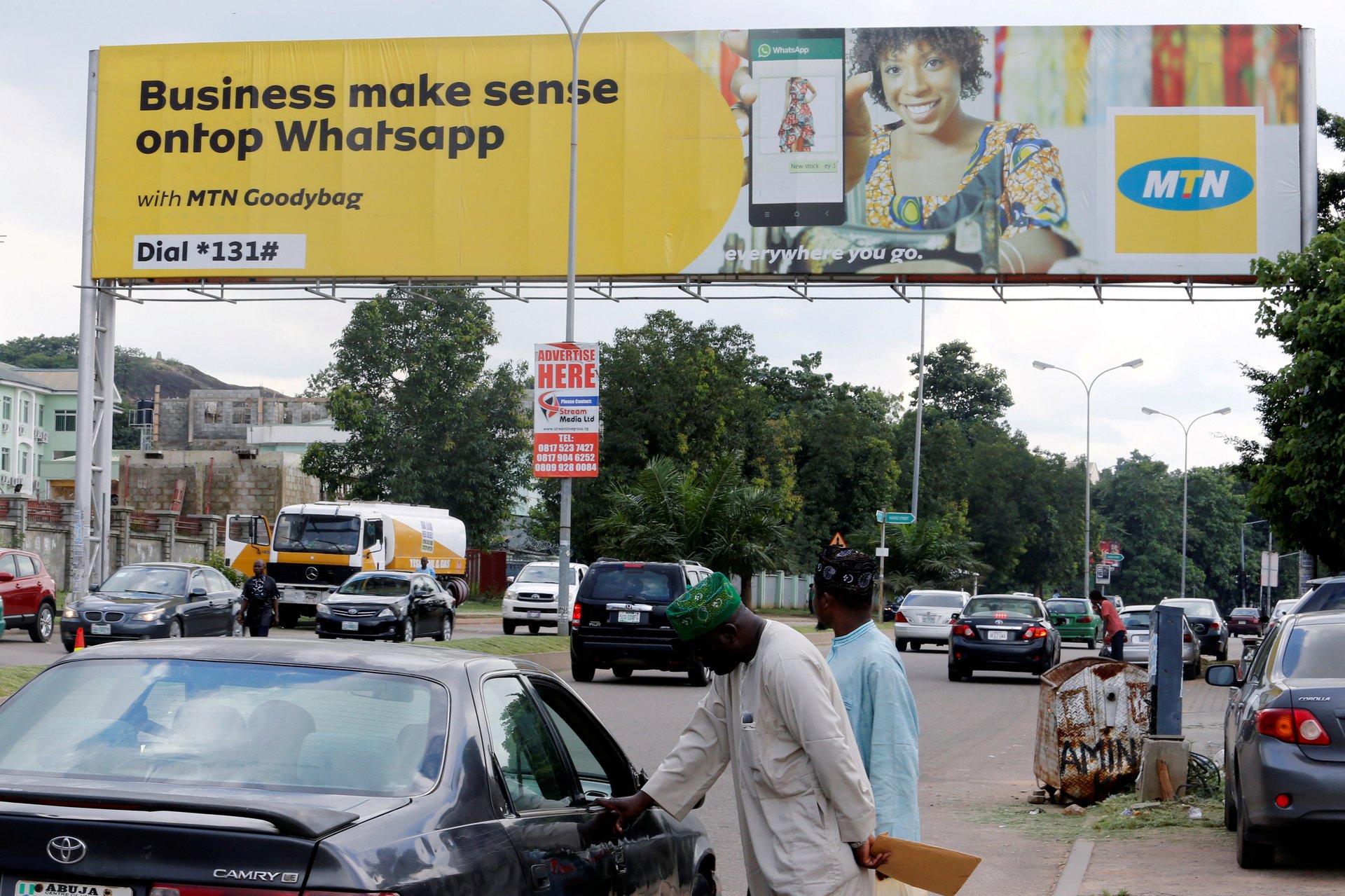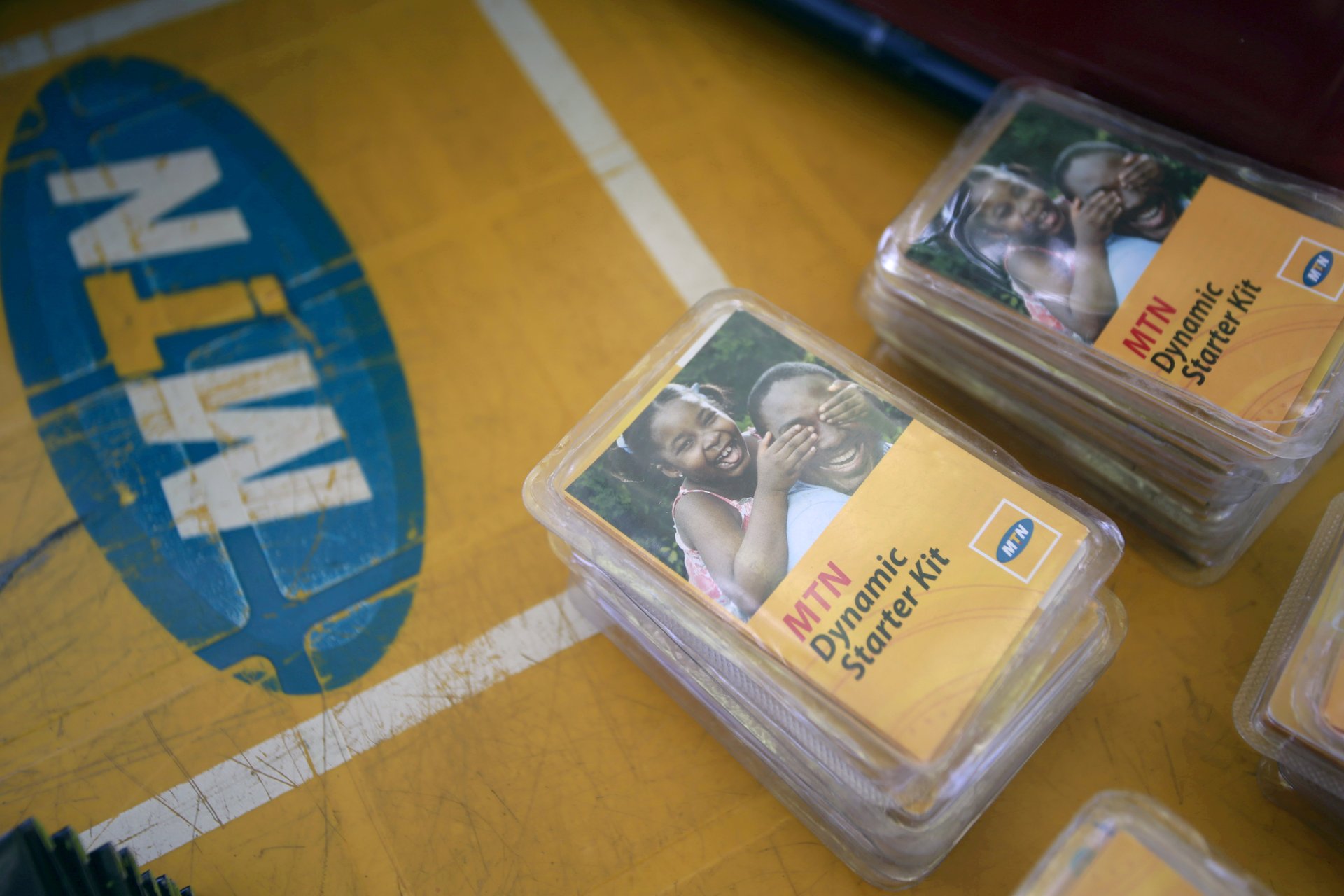MTN and the multibillion-dollar perils of Nigeria’s regulatory minefield
Nigerian officials like to tell a story about the telecoms revolution that began in Nigeria in 2001. It involves how Vodafone, the British telecoms giant, had been offered the chance to enter Nigeria’s nascent market on the cheap. The mobile phone company considered Nigeria a risk not worth taking and passed on the opportunity. In the end, MTN, a younger, smaller rival from South Africa, and a couple of other operators took a chance on the country in an auction where they each paid $285m for a license.


Nigerian officials like to tell a story about the telecoms revolution that began in Nigeria in 2001. It involves how Vodafone, the British telecoms giant, had been offered the chance to enter Nigeria’s nascent market on the cheap. The mobile phone company considered Nigeria a risk not worth taking and passed on the opportunity. In the end, MTN, a younger, smaller rival from South Africa, and a couple of other operators took a chance on the country in an auction where they each paid $285m for a license.
To say that their bets paid off spectacularly will be a gross understatement. From a standing start in 2001, the Nigerian telecoms industry has grown into a multibillion-dollar industry, Africa’s largest telecoms market. Every few years, almost always in front of an international audience, a senior Nigerian government official repeats a version of that story to illustrate the folly of ignoring Nigeria as an investment destination.
It is not possible to tell that story without MTN. While the other licensees went through ownership changes and slow rollouts, MTN aggressively expanded in Nigeria and quickly asserted its dominance in the country after the first call was made on its network in May 2001. Today it has more than 55 million customers in almost 4,000 villages, towns and cities across every state in the country. It has followed up its initial investment of $400 million (a lot to risk on Nigeria at the time, barely out of military rule and economic sanctions and with an economy hobbled by painful external debts) with further investments of perhaps $13 billion. MTN has said it’s paid out over two trillion naira ($5.5 billion at today’s rates) in taxes to the federal government since it began operating in Nigeria.

It’s difficult to overstate the impact on the economy with the number of indirect jobs MTN has created across the telecoms value chain. Living in Nigeria back in the day, I watched many young people come into money literally overnight from being plugged into the MTN value chain in some way.
But in 2015, something changed and MTN went from model corporate citizen to pariah status overnight. In October of that year, the company was hit with a $5.2 billion fine for failing to disconnect just over five million lines that did not pass muster during a registration exercise carried out across the industry that year. The size of the fine—37% of its revenues and more than double its annual profits—sent shockwaves through the industry. The telecoms regulator’s approach to the issue brought to mind the former Italian prime minister Giovanni Giolitti’s famous quip that you apply the law to your enemies and you interpret it for your friends.
The regulator went public with the fine and insisted that it must be paid in full. In the end, after a drawn out process that claimed the CEO of MTN and involved the drafting former US attorney general, Eric Holder, as a negotiator, the fine was reduced to $1.7 billion. The company also made several concessions including promising to list its shares on the Nigerian Stock Exchange, a process that was ongoing before the company was hit with the latest salvos last month.
“Not again”
Once more, and totally out of the blue, the Central Bank of Nigeria (CBN) on Aug. 29 wrote a letter to MTN demanding the phone giant return $8.1 billion it had “illegally repatriated” out of the country between 2007 and 2015. This dispute this time comes from Nigeria’s often arcane and byzantine foreign exchange laws. To explain, Nigeria has always had controls on foreign exchange moving in and out of the country. The CBN thus plays a big part, by default, in almost all forex transactions in the country, for better or worse.
Bringing in foreign investment into Nigeria gets you something known as a Certificate of Capital Importation (CCI). What the CCI does is to guarantee you access to official foreign exchange markets (the CBN and interbank market) should you need to repatriate your profits in foreign currency. In theory you can ignore all of this by simply bringing in your capital and buying dollars off the black market if you need to take profits out. The trouble is Nigeria has not had a single foreign exchange rate for as long as anyone can remember and the official and black markets often diverge wildly—the black market famously offered a 400% premium on the official rate during the late 90s rule of Nigeria’s notorious dictator, general Sani Abacha.
The black market is often shallow as well. It can probably handle a couple of million dollars easily but there have been stories of how one person putting in an order to buy $10 million caused rates to move wildly. Filling such an order might involve physically pounding the streets of Lagos going from one bureau de change to another mopping up whatever dollars can be had.
Capital importation
The Certificate of Capital Importation (CCI) process features some other wrinkles. If you bring in capital as equity, you get an equity CCI. Against such a CCI, you can only repatriate dividends. In fact, dividends are the only permitted type of return on equity. If you bring in capital in the form of a loan, you get a loan CCI which means you can only repatriate loan repayments on those CCIs. It goes without saying that repatriating dividends on the back of a loans CCI is an offense.
Back when MTN brought in its initial capital of $400 million, it contained a mix of equity and shareholder loans. The shareholder loans however behaved almost exactly like equity in that they attracted no interest and the shareholders never asked the company to repay them. Still, the only type of repatriation permissible with those shareholder loans was of course loan repayments, of which there were none. But strictly speaking, that should not matter at all as under Nigerian law even $1 of equity capital with a CCI allows an unlimited amount of dividends to be repatriated through it. I have spoken with several bankers with institutional memory of those days and others who worked directly on the transactions and they all tell me that all dividends were repatriated using the equity CCIs. I have no reason to doubt them. They all stress that they believe the CBN must have known about the dividend repatriations at the time. This makes sense as it is hard to imagine even a million dollars moving out of the Nigerian economy without the CBN knowing about it, never mind billions.
At some point in 2006, MTN decided to carry out a restructuring of its shareholding by converting the shareholder loans to preference shares. These preference shares CCIs—or preferred stock as it’s called in the US—do not qualify for dividend repatriation anyway so it was hardly anything more than a technical move by a private company. For reasons that remain unclear (or perhaps above my pay grade), this business of a private company changing its shareholding structure needed approval from the CBN (or CBN claimed it needed its approval) and it demanded that MTN’s bankers apply for an approval. In its letter CBN says, the bank, Standard Chartered, duly applied and received an ‘approval in principle’ (AIP) from the CBN conditional on the bank providing further documentation.

Here lies the crux of CBN’s allegations: it claims the bank never completed the process, and thus never received a final approval from it, but that it went ahead with the conversion and began to repatriate dividends on the back of the newly issued preference shares CCIs (CCIs are issued by the banks through which the foreign capital comes in and submitted to CBN). Thus, all dividends repatriated from 2007 to 2015 were declared ‘illegal’ and are to be returned to the country immediately. If none of this makes sense, the fault is not with you, dear reader.
In the midst of all this, last week, the attorney general, freelancing as the nation’s taxman, slapped the company with a tax bill of $2 billion relating to VAT and import duties. It remains unclear how the tax bill was arrived at or what indeed the nation’s chief lawyer was doing working out taxes for businesses given that no vacancy for the role of taxman has been announced.
What sense does it make for a bank in possession of equity CCIs to repatriate dividends using shareholder loan or preference shares CCIs? There is no cap on the amount of dividends you can repatriate for every dollar you bring into the country.
There is no shortage of conspiracy theories on Nigerian Whatsapp chat groups and social media as to who or what is behind the attacks on MTN ranging from the barely credible to the outlandish—the Nigerian rumor mill greatly abhors a vacuum. But allow me to offer a simple yet unoriginal theory.
“Nigeria the victim”
MTN’s original investment has paid off in ways that no one, not even MTN, could have foreseen. As can be seen from the numbers above, an initial investment of $400 million has yielded billions in dividends for the company. An entire class of Nigerian billionaires who were lucky to get in early and have built their fortunes on the returns, also emerged from it. But the default in Nigeria is to view trade—especially trade with foreigners—as zero sum.
This is the belief that whatever profits any foreigner makes from Nigeria is at the expense of Nigerians. It is a view held by the average man on the street right up to the nation’s leaders. It is as normal as night following day to see reports in Nigerian newspapers of the country “losing’billions” due to importing one thing or the other. That the country paid for something it needed and received that thing is never considered in such reports. Simply by importing and paying for something, the country has lost money.
Take the recent comical example of Nigeria’s agriculture minister, Audu Ogbeh, making the bizarre claim unemployment had spiked in Thailand after rice mills in that country were shut down all because, he claimed, Nigeria had been planting more rice and by extension reduced its importation of Thai rice. He boasted Nigeria was at last inflicting pain on another country by cutting off the avenue through which the country (Nigeria) had been exploited in the past, by, you know, trade. Even after the reports were proven to be false by newspapers and social media, the minister never bothered to withdraw his claim. But he was on safe ground because many Nigerians agree with the sentiment and politicians never knowingly let an opportunity to reinforce this view pass.
Insular
The reasons for this deep-seated hostility to trade are varied. They range from the historical (the slave trade, and colonialism after it, didn’t exactly leave people gagging for more of either) to the geographical (Nigeria is hardly on the way to anywhere). But here’s my simple but unoriginal theory—Nigerian businesses have never really successfully travelled outside of the country in the way that is common in South Africa and several western countries where a company like MTN earns most of its profits from outside South Africa. A few Nigerian banks have made half-hearted attempts to expand across the continent but where they don’t end up in fiascos, they hardly make any money. The country’s richest man, Aliko Dangote, has lately been on an expansionist drive across Africa with his cement business but so far with mixed results. Ultimately, Nigeria continues to subsidize his investments elsewhere—more than 90% of the cement group’s profits still come from Nigeria.
Nigerian leaders have no experience of having to defend the rights of a successful Nigerian business which does very well abroad and repatriates profits back to the country. The closest thing to that is the country’s large diaspora who send billions of dollars back home every year. But beyond that, there is just no experience of a company like MTN or Multichoice or Shoprite for Nigerians. Nigerian leaders thus play up the country’s 180 million people as a “market” and naturally make it out as something to be protected from ‘exploitation’ by rapacious foreigners. In that sense, perhaps it was always coming for MTN.
Yet all of this is very dangerous for the Nigerian economy. The country has barely recovered from a damaging recession in 2016 and badly needs all the foreign investment it can get. The latest inquisition into MTN going back more than a decade and dredging up paper forms would have spooked any foreign investors in the country. The impression it gives is that once the authorities come after you, they will go as far as they need to find anything to use against you. Bankers I have spoken to say the rate of outflows have picked up in the first week of September, after a net outflow of $800 million in August. If investors continue to take flight, the CBN will be forced to react with more capital controls.
It is difficult to understand the rationale for these new actions. The first fine for failing to disconnect lines at least had the benefit of being easy to understand even if it was grossly excessive. But it’s not clear what the point of the CCI and tax drama is. Is the country trying to force MTN to leave the country? This week MTN applied to federal high court to push back against the government’s claims in a move that seemed to be about buying time. This could run for a while.
Ultimately, what is the upside of treating the poster boy of foreign investment in Nigeria in this way? Nigeria, never the easiest place to do business even on the best of days, has now added a lot of uncertainty into the business climate. No one can say for sure where all of this will end.
But maybe one can hope that calm heads will prevail soon.
Sign up to the Quartz Africa Weekly Brief here for news and analysis on African business, tech and innovation in your inbox